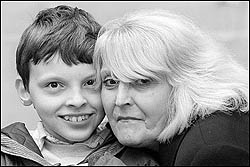 BATTLING ON: Gregg Draper and his mother
Sheila are fighting for justice with other families who want proper compensation
BATTLING ON: Gregg Draper and his mother
Sheila are fighting for justice with other families who want proper compensation BATTLING ON: Gregg Draper and his mother
Sheila are fighting for justice with other families who want proper compensation BATTLING ON: Gregg Draper and his mother
Sheila are fighting for justice with other families who want proper compensation |
The forgotten vaccine victims
Express 2000
Earlier this month, Gregg, 15, and his mother Sheila were watching television at their home in Northumberland. Gregg turned to his mother and uttered a sentence which has been haunting her ever since. "You know Mummy, I'm disappointed with this life," he said.
Gregg has cerebral palsy. He can't move his arms or his legs, and he never will. Mentally, he's all there, but physically he never will be, as he knew for himself at the age of eight. Gregg is one of a very small number of children who are severely brain damaged every year by childhood vaccines such as whooping cough, polio, smallpox and measles. Only an estimated one in a million children is affected, yet they are the forgotten victims of Britain's successful immunisation programme.
A maximum of £40,000 compensation is payable - and only if parents can prove that their child is 80 per cent brain damaged. The rest get nothing.
The parents of these so-called "medical accidents" who have suffered for the majority's benefit are campaigning for more money from the Government. They marched on Whitehall last week and are now waiting to hear the results of a review of the payments.
Gregg was six months old in 1985 when he was damaged by the whooping cough vaccine.
"He was vaccinated at lunchtime, and I went to give him his last feed at 9.30pm," Sheila recalls. "When I lifted him out of his pram, I got the most terrible shock. His eyes were turned up and you couldn't see his pupils. He was burning hot and I could feel him having jerks down the whole of his left side. Then he started screaming and screaming, and didn't stop until 1pm the next day. I was all alone because my husband Roger is in the merchant navy."
A paediatrician instantly and correctly diagnosed brain damage, which was confirmed by a brain scan a couple of hours later. Gregg's reaction to the vaccination was extremely rare, so much so that there are no reliable figures as to the number of children who will respond in a similar way. But since the Vaccine Damage Payment Act was passed in 1979, more than 900 payouts to victims have been made, out of a total of 4,144 claims.
In 1979, the maximum payout allowed under the scheme was just £10,000: in 1985 this was increased to £20,000, there was a further £10,000 increase in 1991 and finally in 1998 it rose to £40,000. Yet £40,000 can barely cover the cost of looking after a badly damaged child for life. In very many cases, parents have had to give up work to care for their children.
Gregg received £20,000 (on the second attempt; the first time he was turned down), while Melissa Price, 24, was awarded £10,000 in 1983.
Melissa looks perfectly normal, but she has the brain capacity of a five-year-old. She has to leave the house in a wheelchair, can't read or write, has seizures and requires 24-hour care, which she gets from her mother Olivia.
Olivia has been campaigning for a better deal for vaccine damaged children since 1981 and in 1997, when the Labour Government came to power, she set up the Vaccine Victims Support Group which has 300 families as members.
"We need to be able to plan our children's future," Olivia says. "What will happen to Melissa eventually, I still don't know. I have a younger son, Stuart, who's 21, but would it be fair to put the burden of her care on him? I know what it takes to look after Melissa full time and if my son gets married, it could cause real problems. My own marriage ended in 1985 because my time revolved around my daughter, and I didn't have enough time for my husband. I didn't give Stuart enough quality time, either. I used to try to make up for it by giving him material things."
Olivia and the other mothers in the group are not against the vaccine programme. They know that an adverse reaction is extremely rare, but they simply want justice for those children who have suffered for the benefit of the majority.
Mike Watson, the medical director of Aventis Pasteur, which distributes vaccines, agrees. "There is a quantifiable risk, even though it is tiny, so you should have a scheme in place to compensate people. In the United States, the vaccine companies contributed to a central fund."
"We are preparing a review of the scheme," says a DSS spokesman. "The current payment levels were set some years ago, and as soon as we can make an announcement we will do so."
Bill Wain, a retired police sergeant from Liverpool, who now lives on the Isle of Wight, will be pleased to hear it. Now 78, he has cared for his 38-year-old son Paul since his wife Eileen died after a stroke two years ago. Paul started having major convulsions four hours after the whooping cough vaccine and has been severely disabled since then.
"When they were in Opposition, the Government said we should be compensated properly," he says.
"It will be very nice if they finally do it."
Contact the Vaccine Victims Support Group on 0121 243 7759.
How to spot the danger signs
These are some of the symptoms that could signal that your child has been vaccine damaged: